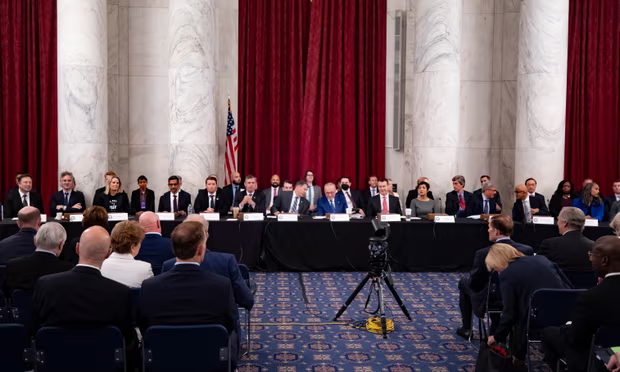Tech pioneers settle on simulated intelligence guideline yet partitioned on how in Washington discussion
Tech leaders, including Sundar Pichai, Elon Musk, Mark Zuckerberg, and Sam Altman, gathered in Washington for a closed-door meeting with US senators to discuss the regulation of artificial intelligence (AI). The discussion, labeled as an "AI safety forum," has gained significance with the upcoming US elections and the rapid advancement of AI technology affecting people's lives and jobs.

Democratic Senator Chuck Schumer, who organized the historic meeting, noted that there was some consensus among participants about the need for regulations but a lack of agreement on the specifics. The central question revolved around whether an independent agency should oversee various aspects of AI development, how to enhance transparency in AI companies, and how the US can maintain its leadership in AI compared to China and other countries.
Elon Musk described the meeting as a civilized conversation among some of the brightest minds globally. Schumer emphasized that Congress must play a role in maximizing the benefits of AI while mitigating potential negative impacts, such as bias, job loss, and the spread of disinformation through deepfakes.
Participants also discussed the urgency of safeguarding the 2024 US elections from AI-driven disinformation, with a focus on watermarking AI-generated content as a potential solution.
The meeting included AI experts and industry leaders such as Bill Gates, former Google CEO Eric Schmidt, and Tristan Harris, co-founder of the Center for Humane Technology, among others. Labor and civil rights groups were also represented.
The rise of generative AI tools, such as ChatGPT, has raised concerns about their societal implications and calls for transparency in data collection and usage.
Mark Zuckerberg, in his remarks, highlighted Meta's collaboration with academics, policymakers, and civil society to mitigate the risks of AI while leveraging its benefits, including watermarking AI-generated content.
Before the meeting, Alphabet Workers Union representatives announced their intention to raise worker issues related to AI raters who have faced low wages and minimal benefits.
Critics argued that the meeting leaned heavily on the opinions of those who stand to benefit from lax AI regulations and called for more diverse voices, especially from marginalized groups impacted by AI biases.
Some lawmakers criticized the private nature of the meeting and called for tech leaders to testify publicly. Republican Senator Josh Hawley, in particular, declined to attend, characterizing it as a gathering to benefit big tech without public transparency.